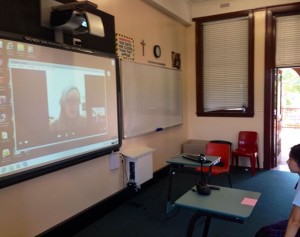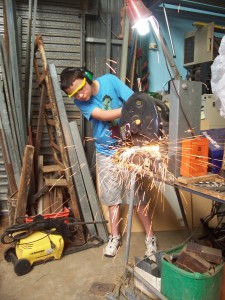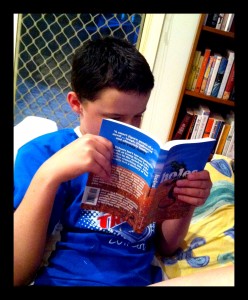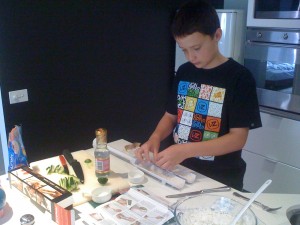
Photo by author: Skype to Palestine (ex-student converted from Christianity to Islam)
Globalisation has had a profound effect on education. The breaking down of political, trading and geographical barriers, strongly influenced by the development of the Internet and advanced communication techniques, is altering education from being inward looking to being more world focused. Instead of peering into textbooks, students are beginning to connect with the wider world through technological processes.
Curriculum is being prescribed for a globalised world but it is politically motivated with too much attention placed on the economy and the students’ future role as a labour resource. The influence of a capitalist economy is also apparent in the political promotion of “choice, competition and performance” in Australian schools, evident in the enforcement of transparency of test results and in the development of national curriculum (Buchanan 2011, p.68).
An example of economic language involved with curriculum is in the discussion of the environment and in particular climate change. The word ‘sustainable’ is used often but in relation to a sustainable economy instead of having the emphasis on sustaining people’s interaction with the environment. For instance, in the draft ACARA Geography Curriculum (2013) the word ‘economy’, or its derivative, appears 66 times. Lambert (2013) argues for Geography to play a greater role in British curriculum, by linking “economic, environmental and educational crises of our times” (p.85) to present a case for a curriculum of survival as opposed to sustainability. Emotive and economic language is all too common in current literature about curriculum (Ditchburn 2012).
The economy, globally and locally, is important but it should not be the dominant force influencing curriculum. There needs to be more emphasis on students being actively involved in all aspects of community, globally and locally, not just the economic component.
The more I examine curriculum the more I am convinced that we should be moving to capabilities as a focus in curriculum (ACARA 2011, Reid 2005). Lambert (2013) is arguing the opposite. He views the shift to ‘competences’ and the integration of subjects causing the “contemporary erosion of trust in specialist knowledge, and increased emphasis on students’ experience” and changing “the emphasis of the curriculum from content to skills and to favour more open ‘facilitative’ pedagogies” (p.89). He then concludes that this shift “almost signals that schools should give up on knowledge” (p.90). Personally, I’m tired of extreme rhetoric. What we need in curriculum and pedagogies is greater balance. There is a place for specialist knowledge, a place for experience in active learning and a place for skills as well as knowledge in modern curriculum.
As technology comes to the fore through globalisation, teachers are as important as ever due to the skill required to balance the numerous influences on education with each unique student that comes before them. I believe in having a structured curriculum and thus resist the term ‘student-directed learning’ which makes me think of ‘free schools’ where students themselves organise learning activities or self-select from the activities provided (Galley 2004). I am an advocate for technology and student-centred learning but there needs to be a balance. I would like to see teachers who generally want to remain traditional, expository in nature, to learn to yield some of the control, place some of the learning process into the hands of students and connect to a community beyond the walls of the classroom. Again, I call for balance and sensibility.
Just as there are an immense variety of students in our education system and a wide range of resources available, each and every school, class and teacher need to adapt accordingly. My dream is of schools, rich and poor, around the world, connecting, allowing all of us to think critically and gain deeper understanding of ourselves and each other. We need to think what is best for our students and community, not necessarily our economy.
Reference List
ACARA (2011). General capabilities. Retrieved from http://www.acara.edu.au/curriculum/general_capabilities.html
ACARA. (2013). Draft F-12 Australian Curriculum – Geography. Retrieved from http://www.acara.edu.au/curriculum_1/learning_areas/humanities_and_social_sciences/geography.html
Buchanan, R. (2011). Paradox, Promise and Public Pedagogy: Implications of the Federal Government’s Digital Education Revolution. Australian Journal of Teacher Education, 36(2), 67-77. DOI: 10.14221/ajte2011v36n2.6
Ditchburn, G. (2012). The Australian Curriculum: finding the hidden narrative?, Critical Studies in Education, 53(3), 347-360. DOI: 10.1080/17508487.2012.703137
Galley, M. (2004). Free Rein. Education Week, 23(36), 27-31. Retrieved from http://web.ebscohost.com.simsrad.net.ocs.mq.edu.au/ehost/
Lambert, D. (2013). Geography in school and a curriculum of survival. Theory and Research in Education, 11(1), 85-98. DOI: 10.1177/1477878512468385
Reid, A. (2005). Rethinking National Curriculum Collaboration: Towards an Australian Curriculum. Department of Education, Science and Training, Canberra. Retrieved from EDCN812, Macquarie University iLearn, http://ilearn.mq.edu.au/course/view.php?id=13878



